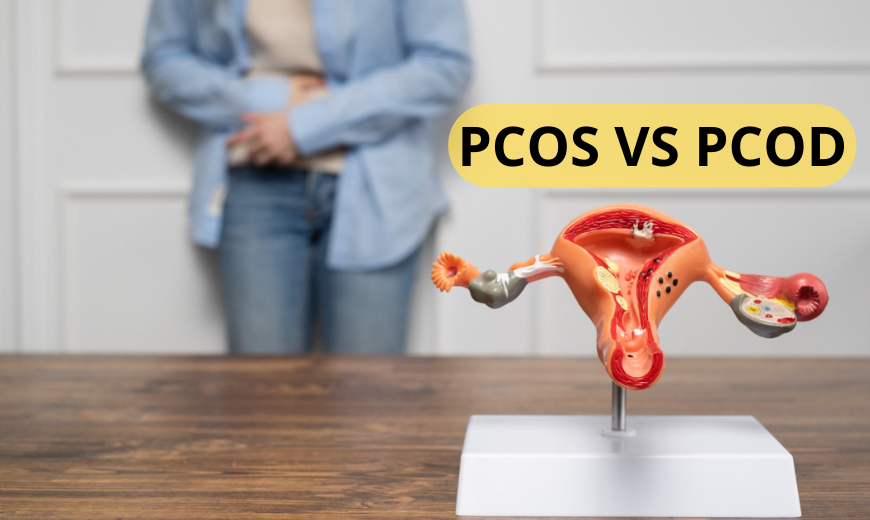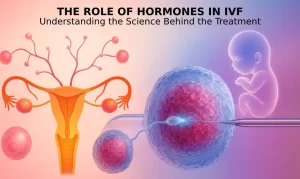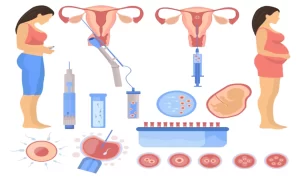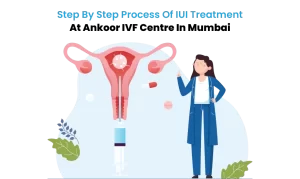This comprehensive guide aims to provide a detailed understanding of PCOS and PCOD, shedding light on their causes, symptoms, complications, and treatment options. We will also discuss the benefits of seeking specialized PCOS treatment in Mumbai and PCOD treatment in Mumbai, where modern medical interventions are paired with holistic care to provide optimal solutions for women.
Understanding PCOS and PCOD
Polycystic Ovary Syndrome (PCOS) and Polycystic Ovary Disease (PCOD) are two closely related hormonal disorders that impact the functioning of a woman’s ovaries. Although they are often mentioned together due to their similarities, they have distinct characteristics that set them apart.
What is PCOS?
Polycystic Ovary Syndrome, commonly referred to as PCOS, is a complex hormonal disorder that affects how a woman’s ovaries function. It is characterized by an overproduction of androgens, which are male hormones naturally present in women in small amounts. This hormonal imbalance disrupts ovulation, causing irregular or absent menstrual cycles, the formation of ovarian cysts, and infertility issues.
Women with PCOS may also experience a variety of metabolic problems, including insulin resistance, which can increase their risk of developing diabetes and heart disease. PCOS is often chronic and requires a long-term management approach, blending lifestyle changes with medical treatments.
What is PCOD?
Polycystic Ovary Disorder (PCOD) is a condition in which the ovaries release immature or partially mature eggs, leading to the formation of multiple cysts over time. While PCOD is also associated with hormonal imbalances, it is often considered less severe than PCOS. Women with PCOD may still maintain regular ovulation and have fewer metabolic complications, although the disorder can still cause symptoms such as irregular periods, acne, and weight gain.
The key difference between PCOS and PCOD lies in the severity and the impact on fertility. PCOD typically does not lead to infertility in most cases, whereas PCOS often has a more significant impact on a woman’s ability to conceive.
Symptoms of PCOS and PCOD
Recognizing the symptoms of PCOS and PCOD early is crucial for effective management. Although the two conditions share many overlapping symptoms, their presentation may vary depending on individual health factors. Below are the primary symptoms associated with each condition:
Irregular Menstrual Cycles
One of the most common signs of both PCOS and PCOD is irregular or absent periods. This occurs due to hormonal imbalances that disrupt the normal ovulation cycle. In PCOS, this symptom is often more pronounced, with some women experiencing cycles that are absent for several months.
Excessive Weight Gain
Many women with PCOS or PCOD struggle with weight gain, particularly in the abdominal region. This weight gain is often tied to insulin resistance, making it challenging to manage through conventional diet and exercise alone.
Skin Issues
Acne, oily skin, and dark patches (acanthosis nigricans) on areas like the neck and underarms are common among women with PCOS and PCOD. These skin problems are usually driven by elevated androgen levels, which overstimulate oil glands and disrupt normal skin function.
Hair-Related Problems
- Excess Hair Growth (Hirsutism): Women with PCOS may notice excessive hair growth on the face, chest, or back due to heightened androgen levels.
- Hair Thinning: At the same time, hair thinning or male-pattern baldness on the scalp is a common concern.
Fatigue and Energy Fluctuations
Hormonal imbalances and metabolic disturbances can result in chronic fatigue and low energy levels. Many women report feeling tired even after adequate sleep.
Fertility Challenges
PCOS is a leading cause of infertility due to irregular ovulation or anovulation (lack of ovulation). While PCOD does not always impact fertility, untreated cases can pose challenges over time.
These symptoms can significantly affect a woman’s quality of life, making early diagnosis and treatment essential. By seeking expert care for PCOS treatment in Mumbai or PCOD treatment Mumbai, women can address these issues with tailored interventions.
Causes of PCOS and PCOD
The exact cause of PCOS and PCOD remains unknown, but researchers believe these conditions result from a combination of genetic, hormonal, and lifestyle factors. Below are the primary contributors:
Genetic Factors
Studies indicate that PCOS and PCOD often run in families. If a close relative, such as a mother or sister, has been diagnosed with either condition, the likelihood of developing it increases significantly.
Insulin Resistance
Insulin resistance is a hallmark of PCOS and plays an important role in its development. When the body’s cells become resistant to insulin, the pancreas compensates by producing more insulin. Elevated insulin levels stimulate the ovaries to produce excess androgens, leading to the symptoms of PCOS.
Hormonal Imbalances
A disruption in the balance of reproductive hormones is a central factor in both PCOS and PCOD. Women with these conditions often have higher-than-normal levels of androgens and lower levels of progesterone, contributing to irregular periods and other symptoms.
Lifestyle and Environmental Factors
A sedentary lifestyle, unhealthy eating habits, stress, and exposure to environmental toxins can exacerbate hormonal imbalances and metabolic dysfunctions, increasing the risk of PCOS and PCOD.
Chronic Inflammation
Low-grade inflammation in the body is another factor linked to PCOS. This inflammation can trigger increased androgen production, worsening symptoms such as weight gain and fatigue.
Treatment Options for PCOS and PCOD
Effective treatment of PCOS and PCOD requires a multifaceted approach that addresses both the symptoms and underlying causes. Below are the primary treatment strategies:
Lifestyle Modifications
Lifestyle changes form the foundation of managing PCOS and PCOD. Women are encouraged to adopt healthier habits to regulate hormones and reduce symptoms:
- Balanced Diet: Incorporate nutrient-dense foods such as fresh fruits, vegetables, whole grains, lean proteins, and healthy fats. Reducing processed foods and refined sugars can improve insulin sensitivity and hormonal balance.
- Regular Exercise: Engaging in activities like walking, jogging, strength training, or yoga can help maintain a healthy weight and improve metabolic function.
- Stress Management: Practices such as mindfulness meditation, deep breathing exercises, and therapy can alleviate stress, which is often a trigger for hormonal imbalances.
Medical Treatments
In many cases, lifestyle modifications alone may not be enough, and medical intervention is necessary.
- Hormonal Therapies: Birth control pills are often prescribed to regulate menstrual cycles and reduce androgen levels.
- Medications for Insulin Resistance: Drugs like Metformin can improve insulin sensitivity, addressing one of the root causes of PCOS.
- Fertility Treatments: For women facing infertility, ovulation-inducing medications or assisted reproductive technologies like IVF are recommended.
Complications of Untreated PCOS and PCOD
Leaving PCOS or PCOD untreated can lead to serious complications, including:
- Type 2 Diabetes: Insulin resistance increases the risk.
- Heart Disease: Hormonal imbalances and obesity elevate cardiovascular risks.
- Endometrial Cancer: Prolonged irregular cycles can lead to abnormal endometrial growth.
- Emotional Well-being: Anxiety, depression, and body image issues are common among affected women.
Final Thought
PCOS and PCOD are complex conditions, but with the right care, women can manage their symptoms effectively and lead healthier lives. Whether through lifestyle changes, medical treatments, or a combination of both, addressing these disorders early can prevent complications and restore balance.
For women in Mumbai, specialized clinics offer cutting-edge solutions tailored to individual needs. If you’re struggling with symptoms, consider exploring PCOS treatment in Mumbai or PCOD treatment in Mumbai for expert guidance and comprehensive care.
FAQs on PCOS and PCOD
While PCOS and PCOD share similar symptoms, they differ in severity and scope:
- PCOS is a hormonal and metabolic disorder that affects overall health and fertility.
- PCOD is an ovarian condition where eggs develop into cysts, often due to lifestyle factors. PCOS is typically more severe and systemic than PCOD.
Neither PCOS nor PCOD can be permanently cured, but they can be effectively managed with lifestyle changes, medications, and medical interventions. Early diagnosis and proper management can significantly reduce symptoms and prevent complications.
Yes, pregnancy is possible with both conditions. While these disorders can cause fertility issues, treatments like ovulation-inducing medications, lifestyle modifications, and advanced options such as IVF (In Vitro Fertilization) can help women conceive successfully.
Yes, women with PCOS are at higher risk of developing mental health issues like anxiety and depression. Hormonal imbalances, physical symptoms like weight gain, and the challenges of infertility can contribute to emotional stress. Seeking support through counseling or therapy, along with appropriate medical treatment, can help manage these mental health concerns.
Yes, PCOS tends to run in families. If your mother or sister has PCOS, you are at a higher risk of developing the condition. Genetics plays a significant role, although lifestyle factors can also contribute to its onset.
PCOD generally has fewer long-term health risks compared to PCOS, but if left untreated, it can lead to complications like infertility, irregular periods, and metabolic issues like obesity and diabetes. It's essential to monitor the condition and seek treatment if symptoms worsen.
Yes, birth control pills are commonly prescribed to regulate menstrual cycles, reduce excess hair growth (hirsutism), and clear up acne associated with PCOS. For PCOD, birth control can also help regulate periods, but may not address all underlying causes.
PCOS can make it more difficult to conceive due to irregular ovulation. However, with the right treatment, such as fertility drugs or IVF, many women with PCOS can successfully become pregnant. It's important to consult a fertility specialist if you're having difficulty conceiving.







